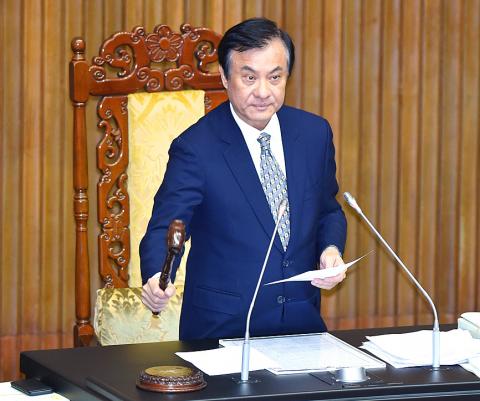Lawmakers yesterday passed amendments to the National Intelligence Services Act (國家情報工作法), which stipulate that intelligence personnel who spy for an external force and leak information on national defense, national security or communications security could face life imprisonment.
The act previously stipulated a prison term of at least seven years for personnel spying for an external force, or three to 10 years if leaked intelligence was not in the three categories.
People who have access to sources of intelligence, channels, agencies or personnel, or information pertaining to the upholding of mobile or land-based communications security would face a prison term of 10 years to life if they are found to have leaked classified information as spies for a benign or hostile external force, the new rules say.

Photo: Liao Chen-huei, Taipei Times
The 30-year statute of limitations for such charges was extended to a lifetime.
If they leaked other classified information while spying for an external force, they would face a prison term of seven to 10 years, the rules say.
People who are not engaged in spying activities, but who leak intelligence would face a prison term of at least seven years, while those who illegally access such information would face three to 10 years behind bars, they say.
Those who illegally damage, destroy or conceal intelligence would face a prison term of three to seven years and a fine of NT$2 million (US$65,970), the amended act says.
The minimum penalty for active or retired intelligence personnel who have been recruited by an external force to conduct espionage missions was raised from three to seven years in prison.
The penalty would also apply to personnel found to have attempted to spy for an external force, the amendments say.
Intelligence personnel who exploit rules in the act that allow them to go undercover or establish companies, stores or organizations to leak intelligence would face 1.5 times the punishments and a fine of up to NT$10 million if they are found to have benefited from their infractions, they say.
Intelligence agencies should pin down, study and analyze commercial secrets that are unduly gathered, stolen, leaked or transferred at the instruction of a benign or hostile external force, they say.
Also passed was a supplementary resolution sponsored by Democratic Progressive Party legislators Wang Ting-yu (王定宇), Wu Kuen-yu (吳焜裕) and Chen Man-li (陳曼麗), as well as independent Legislator Freddy Lim (林昶佐) that grants active intelligence personnel and their family members discounted medical fees at military hospitals.
Intelligence personnel who have accrued seniority and their families should be granted the same healthcare and childrearing benefits that retired military personnel receive, the resolution says.
As intelligence personnel are the most susceptible group to being recruited by external forces, and their lives and the lives of their families are at risk whenever they are abroad, the benefits would make them more willing to stay in their posts longer, the legislators said.

Taiwan is gearing up to celebrate the New Year at events across the country, headlined by the annual countdown and Taipei 101 fireworks display at midnight. Many of the events are to be livesteamed online. See below for lineups and links: Taipei Taipei’s New Year’s Party 2026 is to begin at 7pm and run until 1am, with the theme “Sailing to the Future.” South Korean girl group KARA is headlining the concert at Taipei City Hall Plaza, with additional performances by Amber An (安心亞), Nick Chou (周湯豪), hip-hop trio Nine One One (玖壹壹), Bii (畢書盡), girl group Genblue (幻藍小熊) and more. The festivities are to

Auckland rang in 2026 with a downtown fireworks display launched from New Zealand’s tallest structure, Sky Tower, making it the first major city to greet the new year at a celebration dampened by rain, while crowds in Taipei braved the elements to watch Taipei 101’s display. South Pacific countries are the first to bid farewell to 2025. Clocks struck midnight in Auckland, with a population of 1.7 million, 18 hours before the famous ball was to drop in New York’s Times Square. The five-minute display involved 3,500 fireworks launched from the 240m Sky Tower. Smaller community events were canceled across New Zealand’s

‘IRRESPONSIBLE’: Beijing’s constant disruption of the ‘status quo’ in the Taiwan Strait has damaged peace, stability and security in the Indo-Pacific region, MOFA said The Presidential Office yesterday condemned China’s launch of another military drill around Taiwan, saying such actions are a “unilateral provocation” that destabilizes regional peace and stability. China should immediately stop the irresponsible and provocative actions, Presidential Office spokeswoman Karen Kuo (郭雅慧) said, after the Chinese People’s Liberation Army (PLA) yesterday announced the start of a new round of joint exercises around Taiwan by the army, navy and air force, which it said were approaching “from different directions.” Code-named “Justice Mission 2025,” the exercises would be conducted in the Taiwan Strait and in areas north, southwest, southeast and east of Taiwan

UNDER WAY: The contract for advanced sensor systems would be fulfilled in Florida, and is expected to be completed by June 2031, the Pentagon said Lockheed Martin has been given a contract involving foreign military sales to Taiwan to meet what Washington calls “an urgent operational need” of Taiwan’s air force, the Pentagon said on Wednesday. The contract has a ceiling value of US$328.5 million, with US$157.3 million in foreign military sales funds obligated at the time of award, the Pentagon said in a statement. “This contract provides for the procurement and delivery of 55 Infrared Search and Track Legion Enhanced Sensor Pods, processors, pod containers and processor containers required to meet the urgent operational need of the Taiwan air force,” it said. The contract’s work would be